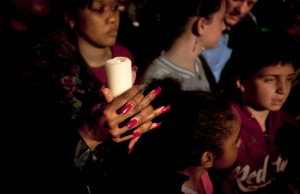Mandela remains critical as relatives meet

A woman from a community group based in Pretoria holds a candle and sings religious songs to show appreciation and support for former South African President, Nelson Mandela, on the street outside the Nelson Mandela’s close family huddled at his rural homestead on Tuesday to discuss the failing health of the South African anti-apartheid icon, who remains in critical condition in hospital. AP PHOTO/BEN CURTIS
QUNU—Nelson Mandela’s close family huddled at his rural homestead on Tuesday to discuss the failing health of the South African anti-apartheid icon who was fighting for his life in hospital.
Messages of support poured in from around the world for the Nobel Peace Prize winner, who spent 27 years behind bars for his struggle under white minority rule and went on to become South Africa’s first black president.
Mandela remained in a critical condition Tuesday, the South African presidency said.
“We must keep him in our prayers and leave the rest to the Almighty to decide on,” Deputy President Kgalema Motlanthe said.
Family members including one of Mandela’s daughters and at least two grandchildren were seen gathering for a meeting in the village of Qunu, where the charismatic former leader spent his childhood tending cattle and living in mud-walled huts.
Article continues after this advertisementThe meeting was called “to discuss delicate matters,” according to South Africa’s SAPA news agency, amid speculation that the location of his possible gravesite was on the agenda.
Article continues after this advertisementTensions emerged between elder clan members and Mandela grandchildren during the talks, according to sources close to the family, although it was unclear exactly why.
The 94-year-old’s condition appeared to take a significant turn for the worse over the weekend with the presidency announcing on Sunday that he was “critical.”
Flowers and messages of support piled up outside the Pretoria hospital where Mandela was admitted on June 8 with a recurring lung problem dating back to his time at the windswept Robben Island prison camp near Cape Town.
“He is a man who changed the world,” said Vusi Mzimanda, who was among the well-wishers.
“He brings hope to everyone,” he said. “I just hope that he will get better and come to us. We don’t want to lose him even though we know it’s late.”
Supporters sang songs for the former president and released 100 white doves outside the hospital.
Some 36 trainee police officers laid flowers.
“The flowers, that’s the only way we can show our appreciation to our former president,” said Brigadier Noma Binuele.
Relatives have been coming to Mandela’s bedside each day as doctors battle to save the moral icon, who was once considered a terrorist by the United States and Britain for his support of violence against the apartheid regime.
Ex-wife Winnie Madikizela-Mandela—herself a figurehead of the anti-apartheid struggle—and his grandchildren visited the hospital on Tuesday.
Anglican Archbishop of Cape Town Thabo Makgoba was also among the visitors, although his aides declined to comment on the reason.
President Jacob Zuma called on South Africans to respect the Mandela family’s “dignity and privacy.”
“We must demonstrate our love and appreciation for his leadership during the struggle for liberation and in our first few years of freedom and democracy by living out his legacy and promoting unity, non-racialism, non-sexism and prosperity in our country,” Zuma said in a statement.
Messages of goodwill also flooded in from overseas.
Zimbabwean Prime Minister Morgan Tsvangirai described the iconic figure as “an inspiration.”
The White House said it was monitoring Mandela’s condition but could not yet say whether his ill health would affect a planned visit by US President Barack Obama to South Africa from Friday as part of a tour of Africa.
In any case, Obama is unlikely to see Mandela as he is “indisposed,” South Africa’s international relations minister Maite Nkoane Mashebane said.
Mandela—who is due to celebrate his 95th birthday on July 18—has been hospitalized four times since December, and South Africans have been coming to terms with his increasing frailty.
Upon his release from jail in 1990 in one of the defining moments of the 20th century, Mandela negotiated an end to apartheid and won the country’s first fully democratic elections.
He served a single term as president, guiding the country away from internecine racial and tribal violence, before taking up a new role as a roving elder statesman and leading AIDS campaigner.
He stepped back from public life in 2004.
The South African government has been criticized following revelations that the military ambulance that carried Mandela to hospital developed engine trouble, resulting in a 40-minute delay until a replacement vehicle arrived.
The presidency said Mandela suffered no harm during the wait for another ambulance to take him from his Johannesburg home to a specialist heart clinic in Pretoria 55 kilometres (30 miles) away.—Simm Mdledle
Originally posted: 7:04 pm | Tuesday, June 25th, 2013